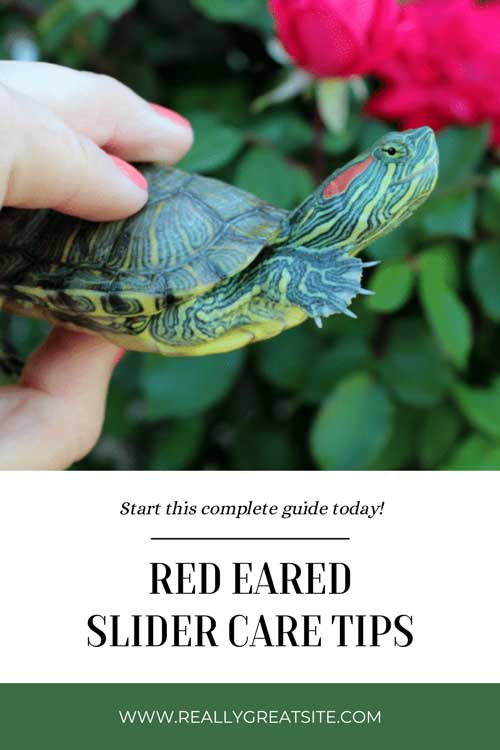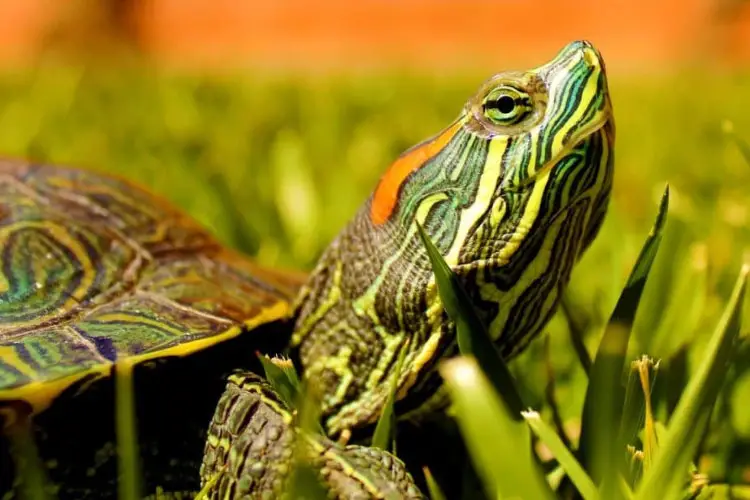Red Eared Slider Care Tips | Do it Right way
Can red eared slider care be difficult? It is pretty easy. With proper habitat and diet, you can easily take care of them.
To take care of the red-eared slider, you need to provide them nutritious food, take care of their health, provide them with a safe and clean aquarium, good mates, recommended supplies, resolve common health issues, and more.
It is hard to get at the beginning, but you will catch up to it soon. So, follow them whenever you are taking care of red eared slider, and it will give you a good morning vibe every day.
Basic Info About Red-Eared Sliders
Contents
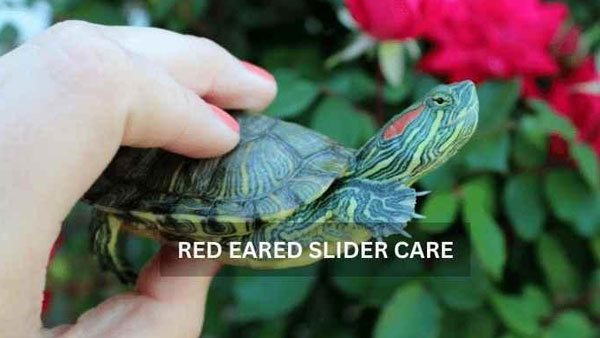
It is important to learn the basic information about the red-eared slider before you keep it as your pet. Sometimes, it may be helpful to understand their behavioral changes.
| Basic Information about Red-Eared Sliders | |
| Scientific Name | Trachemys Scripta Elegans |
| Common Name | Red-eared Slider |
| Adult Size | Male – 12 inchesFemale – 12+ inches |
| Lifespan | Around 30 years |
| Diet | Omnivores |
| Range | Mississippi Valley from Illinois to the Gulf of Mexico |
| Behavior | Retraction – When feeling uncomfortableSunbathing – To absorb warmth and UVBPacing – Eager anticipation of foodFluttering – Asserting dominance, A behavior towards females.Stacking – A form of competition for the best basking spot. |
| Clutch Size | Between 2 and 30 eggs |
| Legal to Keep in the USA | Requires a permit from the state to own |
| Extinction Status | Least concern |
Are Red-Eared Sliders Easy to Take Care of?

In the pet trade market, red-eared sliders are very popular. They are relatively easy to care for, but there are a few things to keep in mind if you consider getting one.
Red-eared sliders need a large tank or enclosure, as they can grow about a foot long. They also require a basking spot where they can warm up and a UVB light to help them absorb calcium.
Red Eared Sliders are omnivorous, so they will eat both plants and meat. You need to feed them both vegetables, along with insects or worms for a better diet.
And as they are social creatures, you should get two or more turtles if possible.
How to Take Red Eared Slider Care to the Maximum Level
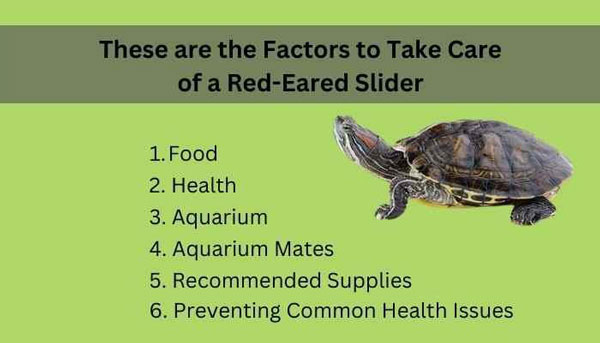
As said before, you can take care of your red-eared sliders easily. With a little knowledge and preparation, you can provide your turtle with the care it needs to stay healthy and happy.
Now, to take care of your red-eared slider, you need to make sure about the followings-
- Food
- Health
- Aquarium
- Aquarium Mates
- Recommended Supplies
- Preventing Common Health Issues
Food
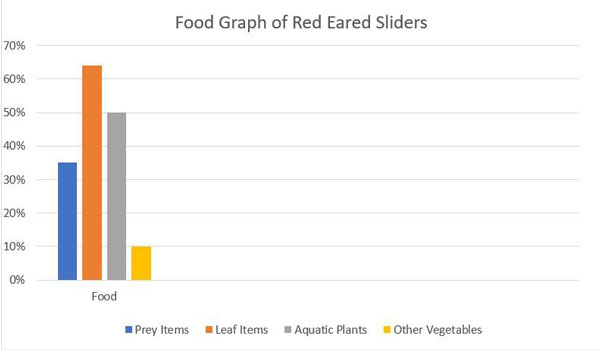
What do red-eared sliders eat? To keep them as pets, this should be the most important part that you need to concentrate on first. The nutritional requirements of red-eared sliders may change with the flow of time.
You need to learn about the red eared slider care sheets and charts to guide them properly.
Commercial pellets are well-nutritioned because they have a good mixture of vitamins and minerals. However, if you provide a variety of food from time to time, the health condition of your little guy can be far better. It will help them always have freshness in their food.
Here is the variety of foods that you can make your red-eared sliders eat-
- Prey Items: Earthworms, Waxworms, Silkworms, Crickets, Shrimp, Krill, Mealworms, Snails, etc.
- Leaf Items: Mustard Greens, Bok Choy, Dandelion Greens, Collard Greens, etc.
- Aquatic Plants: Anacharis, Water Lettuce, Duckweed, Azolla, Water Hyacinth, etc.
- Other Vegetables: Carrots, Green Beans, Squash, etc.
Health
Checking, the health condition of a red-eared slider, is a must. As the owner, taking care of it to the fullest is your responsibility.
Now, first, you need to see the health condition of your red-eared slider. Here are some signs of a healthy red-eared slider-
Healthy Signs
- Eats regularly
- Has a hard shell with no lesions
- Healthy skin
- Active and alert
- Clear nose
If your red-eared slider is facing any of the issues below, this means they have some common health issues. So, check them carefully-
Unhealthy Signs
- Bubbles discharging from eye, nose, or mouth.
- Overgrown beak
- Runny nose
- Swelling ears and eyes
- Lethargy
- Discoloration
Common Health Issues
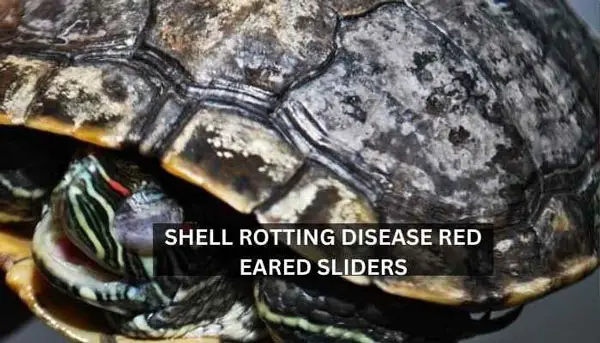
When you are observing your red-eared slider and finding any of the above issues, that means the baby pet is facing common health issues. Here are some of the common health issues, symptoms, and how you can protect your little pet from them given below-
| Health Issue | Symptoms | Prevention |
| Shell Rotting | Foul-smelling patches or pits on the shell. The shell mainly becomes infected due to the lack of UV light or improper diet. | Veterinarian consultation, Proper UV light, and nutrition provide. |
| Eye and Ear Infection | Swelling eyes and side of the ears. Vitamin A deficiency. | Veterinarian consultation, Provide more Vitamin A as supplementary. |
| Respiratory Infection | Discharge of bubbles from eyes, ears, or mouth, sneezing, etc. | Consult a veterinarian immediately. |
| GI Tract Parasites | Not eating properly, deaf, diarrhea, etc. | Consult a veterinarian immediately. |
Here is a video that will give you more information about a common disease of red-eared sliders-
Can You Keep a Red Eared Slider as a Pet?
Yes, you can keep a red-eared slider as a pet. It is legal everywhere to keep red-eared sliders as pets. They are native to the US from Louisiana up the Mississippi to around Ohio.
Also, they have been introduced far outside their range and are thriving. They make decent pets but need an aquarium, water at least as deep as their shell is long, a dry place to haul out on, and a UV reptile light over the haul-out place for about 12 hours a day.
But you should take care of the red eared slider as it is a sensitive animal. If not, then you are not eligible to take them as your pet.
Also, you can take a full-grown red-eared slider as pets, as they can get accustomed to the weather very well.
What Does a Red-Eared Slider Need in a Tank?
A red eared slider needs at least a 20-gallon tank. It is best to have a larger tank, so they have room to swim and grow. They also need a basking spot with a basking light to help them regulate their body temperature.
The basking spot should be large enough for the turtle to completely get out of the water and be at the tank’s warmest end. The basking light should be a full-spectrum UVB light to help the turtle synthesize vitamin D3.
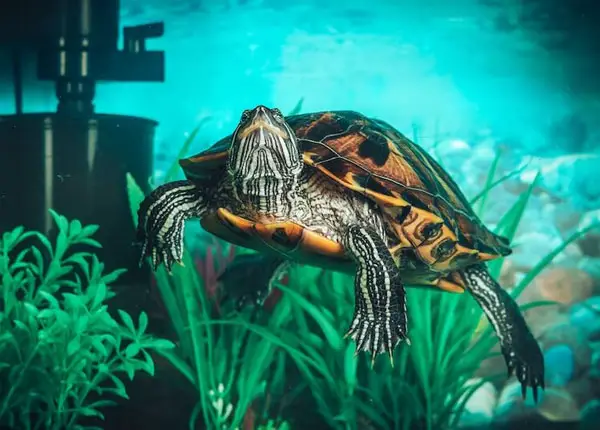
The tank also needs a filter to keep the water clean and a water heater to maintain a consistent water temperature.
Frequently Asked Questions
No, red-eared sliders feel irritated being held or handheld. They normally want to be open and independent when you take care of them.
Yes, Red-eared turtles recognize their owners easily. Sometimes, it may be a bit unbelievable by most people, but this is the truth!
In fact, many owners comment how their pets come by swimming right up to the surface just to see their owner!
Final Words
Red eared slider care is essential as they are fragile. Turtles are omnivores and are usually fed dry food, pellets, and vegetables. Their shed shells should be replaced every 6 months.
Red-eared sliders should be kept in tanks with adequate amounts of water at all times. They should also be provided with hiding places and hiding places need to be altered regularly.
